CBSE Class 11-science Answered
if a be the smallest positive root of the equation
?sin(1-x) = ?cosx,
then the approximate integral value of (a-1) must be?
Asked by | 13 Nov, 2012, 01:35: PM
?sin(1-x) = ?cosx
Squaring both side with condition that sin(1-x)>0,cosx>0
Sin (1-x)=cosx
Cosx=cos(?/2-1+x)
x=2n?±(?/2-1+x)nI
Considering only negative sign as +sign will give no solution
x=2n?-?/2+1-x
2x=2n?-?/2+1
For smallest positive root
n=1
2x=2?-?/2+1
x=3?/4+1/2 does not satisfy the condition that sin(1-x)>0,cosx>0
n=2
x=7?/4+1/2satisfy the condition that sin(1-x)>0,cosx>0
so approximate integral value of root=6
so a=6
a-1=5
Answered by | 18 Nov, 2012, 04:43: PM
Concept Videos
CBSE 11-science - Maths
Asked by rajyothi64 | 05 Mar, 2024, 09:49: PM
CBSE 11-science - Maths
Asked by ghoshshawata62 | 04 Mar, 2024, 08:16: PM
CBSE 11-science - Maths
Asked by nayaktapaswini2007 | 29 Feb, 2024, 09:10: AM
CBSE 11-science - Maths
Asked by bimanmandal53361 | 15 Jan, 2024, 12:32: AM
CBSE 11-science - Maths
Asked by sreyas.katuri | 23 Sep, 2023, 07:12: AM
CBSE 11-science - Maths
Asked by 069.pks | 16 Sep, 2023, 10:06: AM
CBSE 11-science - Maths
Asked by surekhashriwas01 | 12 Sep, 2023, 08:39: PM
CBSE 11-science - Maths
Asked by mvr23467 | 12 Sep, 2023, 07:52: PM
CBSE 11-science - Maths
Asked by SasipriyaNagappan | 27 Jul, 2023, 07:22: PM








